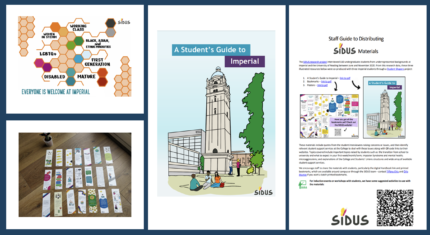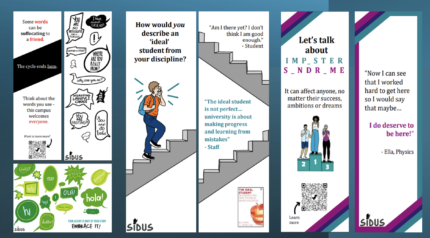The higher education system is unfair and unequal. Students experience inequalities in areas such as access to university, transition to university, sense of belonging, academic grades, and career opportunities.
For some groups of students, these inequalities are more frequent and regular than others and can often be mapped onto their different and intersecting social identities and locations.
Some of these students will hold preconceived notions of what a university student should be like, and these can impact their learning experience. This can be most apparent in groups who may have had different schooling experiences to the majority of their peers, such as mature students. Students from underrepresented groups such as minority ethnic students, and students from working-class backgrounds often have limited or no previous knowledge of higher education and don’t feel entitled to use or ask for support.
This doubles down on any lack of belonging they might have already felt within the academic community.
The “ideal” student
Our research on underrepresented students found that holding preconceived notions of what an “ideal” student is like can lead to them not asking for help or support when they need it or not flagging that they do not understand something. This is often through a fear that to do so will make them appear incompetent or contradict their goal of becoming independent learners – which is often cited as the key attribute of a successful university student. We also found that some students feel that asking for help will make them appear weak or dependent.
Interestingly, when it came to student academic support services, rather than not being aware of the help and support services available to them, they actually do not use them for fear of the unknown. In other words, students tend to know what would be available for them but might not actually go and use them because they are unsure of what to expect.
All this points to not necessarily needing more support in practice but a concerted effort to be more explicit about what it means to be a university student.
This includes:
- Encouraging a growth mindset, normalising asking for help, and encouraging students to see collaborative and consultative working as a strength rather than a weakness.
- Embedding support into the curriculum.
- Being clear with students that we know they may not already understand what is expected of them and how they will learn at university.
- Avoid placing all responsibility on students to access services and request support.
- Broaden and diversify how students can access such support by being more welcoming and accessible through open-door policies, flexible timings, and online meeting options.
Students as partners
At Imperial College London, we worked in partnership with students to co-develop resources to support student transition to university and recognise difficult areas of their university life such as imposter syndrome, sense of belonging, mental wellbeing, microaggression and what it means to be a university student.
These are examples of some of our pedagogical resources


We used these materials during the induction, teaching sessions and personal tutoring to initiate conversations with students about the social and emotional issues that come with transitioning to university – which tend not to be discussed in the curriculum. Some students said:
“… it focused on a lot of issues that I know I struggle with, and I know other people struggle with, but don’t talk about”
“… one thing I really enjoy about the resources… There are really positive themes but there’s also quite serious themes as well… there are some things that I find really difficult to read and things I relate to as well, which makes it feel very real.”
Our initiative was grounded by our strong belief in the power that normalising struggles and asking for help is an important and essential part of learning. Establishing an environment that is truly inclusive and diverse requires a holistic long-term process, but small steps can make huge differences. We have started to see the emerging positive impact on the student learning experience in our learning community. Visit our website for more information.













Some great ideas, thanks for sharing!
Thank you for sharing. Any student data (eg on current topic, transition, mental health etc) comparing a Russell group university that’s world renowned eg Imperial, to a eg post 92 university?
With a son in university with a chronic lack of confidence, this article resonated. Huge fear of asking for help and little naturally occurring opportunity to do so, or encouragement by tutors to normalise that, it’s no wonder he feels lost. The subsequent mental health issues are merely the upshot. The approaches and resources are great, well done.